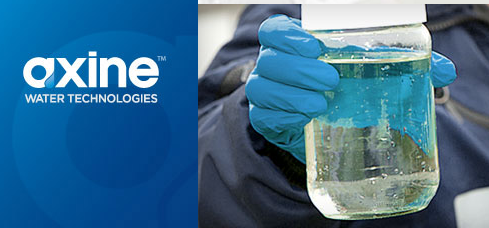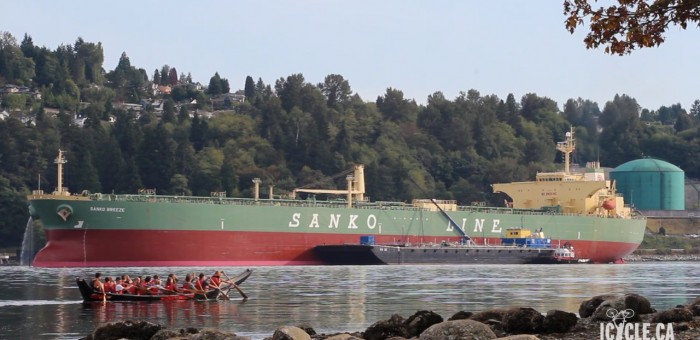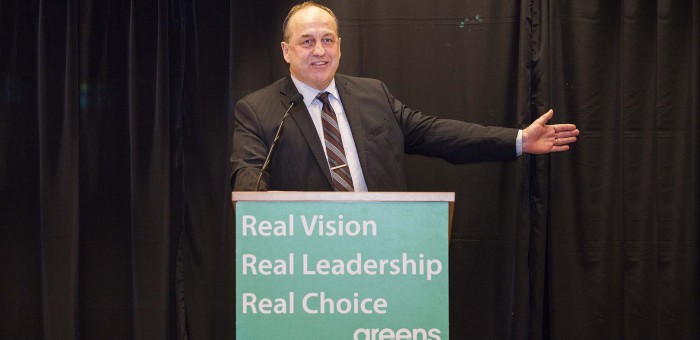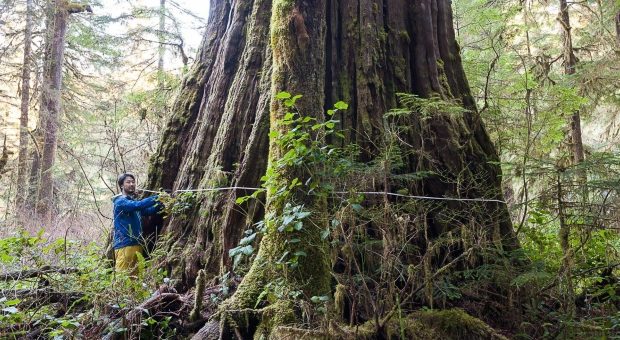Issues & Community Blog - Andrew Weaver: A Climate for Hope - Page 115
Celebrating Local Businesses in our Community – Axine Water Technologies Inc.
At times, discussing the challenges facing our environment – especially as it pertains to expansive issues like water pollution – can be overwhelming and discouraging. While these worries are not misplaced, it’s important to talk about solutions and appreciate improvements too. Yes, there are a lot of obstacles ahead of us, but there are also a lot of amazing people in BC working to improve the way we interact with the environment. Clean tech, in particular, is an incredibly inspiring sector.
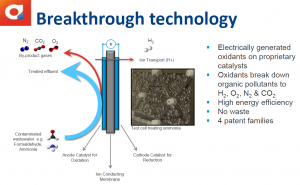 In March, before the spring legislative sitting got too busy, I had the distinct honor of visiting a clean tech company that is transforming the way industrial companies treat their wastewater; Axine Water Technologies Inc., based on UBC’s Vancouver campus. Jonathan Rhone, Axine’s Chief Executive Officer, and Jessica Verhagen, the Business Development Executive, walked me through the basics of their electrochemical technology and took me on a tour of their facility. It was a morning that left me marveling at human ingenuity and excited about the potential for progress in reducing the environmental impact of a wide range of industries.
In March, before the spring legislative sitting got too busy, I had the distinct honor of visiting a clean tech company that is transforming the way industrial companies treat their wastewater; Axine Water Technologies Inc., based on UBC’s Vancouver campus. Jonathan Rhone, Axine’s Chief Executive Officer, and Jessica Verhagen, the Business Development Executive, walked me through the basics of their electrochemical technology and took me on a tour of their facility. It was a morning that left me marveling at human ingenuity and excited about the potential for progress in reducing the environmental impact of a wide range of industries.
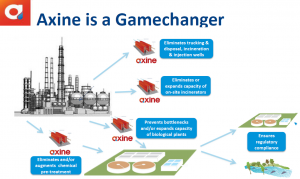 Axine has developed an innovative, low cost, chemical-free way for large companies to clean industrial wastewater by removing high concentrations of complex, toxic organics and ammonia. Their system has simultaneously solved a multi-billion dollar headache for companies, and a staggering environmental problem.
Axine has developed an innovative, low cost, chemical-free way for large companies to clean industrial wastewater by removing high concentrations of complex, toxic organics and ammonia. Their system has simultaneously solved a multi-billion dollar headache for companies, and a staggering environmental problem.
Over 10 billion pounds of toxic chemical wastewater are produced annually from chemical, pharmaceutical, petroleum product, and electronic manufacturers in the US. As Jonathan told me in our meeting, that wastewater is becoming more complex, hazardous, difficult, and expensive to treat, posing a growing threat to communities and industry.
“Billions of gallons are so toxic that the only solution is to truck it off-site to be incinerated or pumped into a deep injection well,” he continued. Jessica added that these wastewaters are subject to increasingly stringent regulations, putting pressure on industry to find the lowest cost solutions.
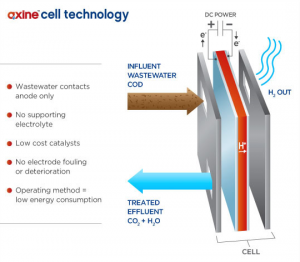 In a system that requires far less electricity than other electrochemical processes, Axine uses electrolytic cells to create free radicals that react with organic compounds, breaking them down into water, nitrogen, a small amount of carbon dioxide and a high-quality stream of hydrogen. Cells are combined in a modular system that is scalable, versatile, and easily adjusted to accommodate different volumes. It requires no chemicals, produces no sludge and can be used to process a wide range of industrial effluent. Once treated, cleaned water can be reused on site, greatly reducing overall industrial water use.
In a system that requires far less electricity than other electrochemical processes, Axine uses electrolytic cells to create free radicals that react with organic compounds, breaking them down into water, nitrogen, a small amount of carbon dioxide and a high-quality stream of hydrogen. Cells are combined in a modular system that is scalable, versatile, and easily adjusted to accommodate different volumes. It requires no chemicals, produces no sludge and can be used to process a wide range of industrial effluent. Once treated, cleaned water can be reused on site, greatly reducing overall industrial water use.
Their system can be integrated into existing treatment plants to target specific pain points without disrupting operations, Jonathan explained. “Our service model enables customers to access the technology with minimal capital investment and technology risk. We eliminate off-site trucking and disposal, reduce production bottlenecks, increase water reuse and ensure compliance with discharge standards.”
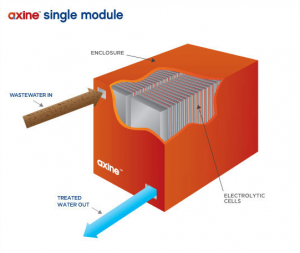 To see their design in action Goran Sparica, their Senior Vice President of Engineering and Operations, took me on a tour of their lab. Amongst the engineers in lab coats were a series of sealed off compartments with glass windows. Some seemed to have wastewater mid-treatment, with murky water on one side and clear water on the other.
To see their design in action Goran Sparica, their Senior Vice President of Engineering and Operations, took me on a tour of their lab. Amongst the engineers in lab coats were a series of sealed off compartments with glass windows. Some seemed to have wastewater mid-treatment, with murky water on one side and clear water on the other.
“Very toxic,” Goran mentioned as we passed a fridge filled with hazardous waste. Stopping at their field pilot prototype Goran explained how waste-water can be treated in 24 hours, noting that there is nothing like this in the world, “we’re the first to do it.”
Though there is huge interest in their technology from China and India, they are going to finish testing in North America before they further explore that market.
 To help the sector compete globally, however, the clean tech sector in B.C. and Canada will need industry-specific leadership from provincial and federal governments. Axine was among the nearly 200 clean technology companies from across Canada that wrote to the federal government last month, asking for focused budgetary support.
To help the sector compete globally, however, the clean tech sector in B.C. and Canada will need industry-specific leadership from provincial and federal governments. Axine was among the nearly 200 clean technology companies from across Canada that wrote to the federal government last month, asking for focused budgetary support.
The clean tech industry in Canada is composed of more than 800 firms that are environmentally safe, diverse, and employ more than 50,000 people. By 2022 it is expected to be a $50 billion dollar industry. It is Canada’s fastest growing sector.
Back on a smaller scale, Jonathan spoke fondly of the company they are developing. “We have incredible employees. Lots of young people who are so passionate about what they’re doing. We’re having a ton of fun, solving environmental problems on the ground floor and building a more sustainable economy.”
NEB Decision on Kinder Morgan Completely Flawed
Media Statement: May 19, 2016
Andrew Weaver – NEB decision on Kinder Morgan completely flawed
For Immediate Release
Victoria B.C. – In response to the Kinder Morgan announcement by the National Energy Board, Andrew Weaver, Leader of the B.C. Green Party and MLA for Oak Bay-Gordon Head has issued the following statement:
“I’m not surprised by the announcement. Kinder Morgan’s Trans Mountain pipeline, and the approval process it went through, appeared rigged from the start,” says Weaver. “As a participating intervenor I watched as other intervenors withdrew in frustration because they knew their participation was futile.”
“Within the limited constraints of the NEB process I submitted nearly 500 questions to Kinder Morgan which focused primarily on the risk and impact of a potential oil spill, the scientific underpinning of the oceanographic analysis used, and the extent of consultation done by the company. It was clear that the process for this project was not about assessing the best scientific evidence, or whether it was in the interests of British Columbians, but was more of a box-ticking exercise.”
“Fundamentally we don’t have the science or the capacity to deal with a diluted bitumen spill on our coast. The provincial government has voiced its opposition to this project already, and even with all the conditions placed on the project, I don’t see how the province could now turn around and approve it.”
Andrew Weaver was the only BC MLA to seek and receive intervenor status for the NEB Hearing Process. He has been involved in the process since December 2013 when he applied.
-30-
Media Contact
Mat Wright
Press Secretary – Andrew Weaver MLA
Cell: 250 216 3382
Mat.wright@leg.bc.ca
Twitter: @MatVic
Parliament Buildings
Room 027C
Victoria BC V8V 1X4
End of Spring Session Re-Cap
Media Release: May 18, 2016
Andrew Weaver – End of Session Recap
For Immediate Release
Victoria B.C. – Andrew Weaver, Leader of the B.C. Green Party and MLA for Oak Bay-Gordon Head has shown that BC politics needs BC Green voices.
“The past few months have shown that the B.C. Green Party can get things done,” says Weaver. “We are willing to work with whoever is in government to advance sound policy that benefits all British Columbians.”
Over the past four months the provincial government has adopted a number of ideas the BC Green Party Leader brought forward. Most significantly, the Sexual Violence and Misconduct Policies Act – the only private member’s bill passed by a government in decades. The government has also adopted his suggestions to close property tax loopholes and gather information on Vancouver’s housing market.
“I think it’s becoming increasingly clear that British Columbia needs more BC green voices in its legislature,” said Weaver. “There are issues that both the BC Liberals and the BC NDP would never discuss were it not for my office bringing them up. I do not think there would be any significant opposition to LNG, nor a bill protecting students in universities, were it not for the BC Greens.”
“As we move towards the 2017 election, the question I think British Columbians will be asking themselves is which party is getting things done? The BC Greens have demonstrated that they will work hard in the best interests of B.C. as a whole. We will leave politics behind when there are opportunities to find solutions and common ground. This is the type of leadership we need in British Columbia.”
-30-
Media Contact
Mat Wright – Press Secretary, Andrew Weaver MLA
1 250 216 3382
mat.wright@leg.bc.ca
Introducing Bill M236 — Environmental Bill of Rights Act, 2016
Today in the Legislature I introduced a bill intituled Environmental Bill of Rights Act, 2016.
This Bill specifically states that British Columbians have a right to a healthy environment and that it is the government’s responsibility to protect it for this generation as well as those to come. There are five key components to this Bill. The Bill:
- outlines the Rights and Responsibilities of the BC Government and its residents when it comes to environmental decision making;
- creates a publicly accessible one-stop-shop for environmental information;
- ensures that all ministries consider the environmental impacts their operations may be responsible for;
- creates an environmental commissioner responsible for investigating violations, providing the public an opportunity to participate in and access the decision making process, and providing regular reports about the state of the B.C. environment.
- protects whistle blowers who act to prevent or mitigate environmental damage.
I am no longer confident that the next generation of British Columbians will enjoy the same opportunities that we have today. The problem is that governments are frequently pitting the environment against industry and it doesn’t have to be that way.
The rhetoric that we hear in this province — the forces of no,’ ‘get to yes’ no matter what the question is — is not helpful to anybody, despite the fact that it’s a great sound bite. The intention of my bill is to create the rules in which industry can operate. Industry has crying out for this; the last thing industry wants is uncertainty. They want to know what the rules are. They want to know what the penalties are. They want to know how they can do business in British Columbia.
Municipalities in BC have recently expressed significant support for an Environment Bill of Rights Act, including 47 who have made a declaration affirming British Columbians rights to a healthy environment (in response to the Blue Dot Tour), as well as passing an endorsement at the 2015 UBCM Convention for a provincial bill outlining the same.
It’s time that we moved on from the outdated thinking that every environmental law brought forward is somehow an attack on industry. I have visited projects across British Columbia and the most successful businesses, which also create the greatest benefits for their local economy, are those that account for their impacts on the environment. This should become the norm for anyone who wants to do business in B.C.
Below I reproduce the video and text of the introduction of my bill. I also reproduce the accompanying media statement.
Video of my Introduction
Text of my Introduction
A. Weaver: I move that a bill intituled Environmental Bill of Rights Act, 2016, of which notice has been given in my name, be introduced and read a first time now.
Motion approved.
A. Weaver: Over the past decade, British Columbia has seen steadied erosion of the environmental laws in our province. The lack of any significant climate action from this province is a clear example. By outlining the rights and responsibilities of the B.C. government and the citizens of British Columbia, this bill is designed to complement and expand upon the existing legislation used when decisions impact the environment.
This bill reinforces British Columbians’ right to a healthy environment and the government’s responsibility to protect it for this generation and those to come. A version of this legislation has already been passed in five legislatures across Canada: Ontario, Quebec, Yukon, Nunavut and Northwest Territories.
Furthermore, 47 municipalities in British Columbia have already made declarations concerning their citizens’ rights to a healthy environment. This was reaffirmed at the UBCM convention last fall when a motion was endorsed to call for legislation that grounded this right in environmental law.
I visited resource development projects across British Columbia. The most successful of these, which also create the greatest benefits for their local economy, are those that account for their impacts on the environment. This should become the norm for anyone who wants to do business in B.C.
The Environmental Bill of Rights Act introduces a number of new policy measures that will assure increased transparency and access to environmental decision-making and create a stronger framework for British Columbians to be included in environmental decisions made in this province.
I move that the bill be placed on the orders of the day for second reading at the next sitting of this House after today.
Bill M236, Environmental Bill of Rights Act, 2016, introduced, read a first time and ordered to be placed on orders of the day for second reading at the next sitting of the House after today.
Media Statement
Media Statement: May 16, 2016
Environmental Bill of Rights Act introduced by Andrew Weaver
For Immediate Release
Victoria B.C. – To safeguard the right of current and future generations to a healthy environment, British Columbians must be able to effectively engage with the provincial government’s duty to protect the environment under its jurisdiction – and to hold the government accountable when they fail to do so, says Andrew Weaver, MLA for Oak Bay – Gordon Head and Leader of the BC Green Party.
In order to accomplish this, today in the legislature Dr. Weaver introduced the Environmental Bill of Rights Act. By outlining the rights and responsibilities of the BC Government and the citizens of British Columbia this bill is designed to complement and expand on the existing legislation used when decisions impact the environment. The bill reinforces British Columbians’ right to a healthy environment and the Government’s responsibility to protect it for this generation and those to come.
“It’s time that we moved on from the outdated thinking that every environmental law brought forward is somehow an attack on industry,” said Weaver. “I have visited projects across British Columbia and the most successful businesses, which also create the greatest benefits for their local economy, are those that account for their impacts on the environment. This should become the norm for anyone who wants to do business in B.C.”
A number of Canadian jurisdictions have enacted similar legislation including Ontario, Quebec, Yukon, Nunavut and the Northwest Territories. In addition, 47 municipalities across British Columbia have passed municipal declarations supporting the right to a healthy environment. A similar declaration was endorsed at the UBCM Conference last fall, which called on the provincial government to enact a provincial environmental bill of rights.
“While we talk a big game in this province about our environmental protections, the fact is that our environmental laws have eroded over time,” said Weaver. “I am no longer confident that the next generation of British Columbians will enjoy the same opportunities that we have today, and I am concerned with the burden we place on them when rushed processes and projects cause unnecessary environmental damage.”
The Environmental Bill of Rights Act introduces a number of new policy tools which will ensure increased transparency and access to environmental decision-making and create a stronger framework for British Columbians to be included in environmental decisions made in this province.
Any decisions involving environmental matters would be documented in a new, publicly accessible, online registry. Currently only certain types of information are available in a generally piecemeal format.
The Bill also creates a new independent Commissioner of the Environment, who is responsible for investigating violations, providing the public an opportunity to participate in and access the process, and providing regular reports about the state of the B.C. environment.
“Frankly, I think it’s time that British Columbians were given more tools to ensure that their province doesn’t just talk a good game about protecting the environment – but is actually doing the job they are elected to do,” said Weaver.
-30-
Media Contact
Mat Wright – Press Secretary Andrew Weaver MLA
1 250 216 3382
mat.wright@leg.bc.ca
GMOs: An Update and Potential Ways Forward in BC
Introduction
Since writing our first backgrounder, we have continued to research the issues surrounding genetically modified foods, and the legislative options available in the BC context. The issue of GMOs is broad and complex and is tied to many larger questions including: our relationship to our food, the effects of large-scale conventional agriculture on human and animal health and the environment, population growth, global warming, industry funding of science, technological advance and its associated risks, and our ability to ensure a sustainable and secure food supply for the future. It is important to be cognizant of these broader issues in developing a response to GMOs, to ensure a well informed and holistic response that does not have unforeseen adverse consequences. We must also work within the context of BC, using the tools we have at our disposal to most appropriately and effectively respond to the issues and questions associated with GMOs.
Jurisdiction
Health Canada and the Canadian Food Inspection Agency (CFIA) share responsibility for food policies on health and safety, regulation, and labelling. The BC Liberal government has said that the responsibility for GM products rests solely with the Federal Government (see here and here and here).
However, in 2001, the BC NDP argued that GM labelling is a consumer information matter, which falls under provincial jurisdiction according to the Constitution Act (1867). During second reading of Bill 18 Genetically-Engineered Food Labelling Act, NDP Attorney General Graeme Bowbrick noted “The province has jurisdiction to legislate on a matter of property and civil rights, which is interpreted to include the authority to legislate with regard to consumer protection and consumer information.”
The Food and Agricultural Products Classification Act (2016) gives the Lieutenant Governor in Council the power to make regulations establishing or adopting certification programs, including making regulations respecting the quality standards of food or agricultural products. However, provincial certification will only apply to operators producing and selling their products within BC; those that sell their produce to other provinces will still require federal certification.
In order to fall within BC’s jurisdiction, the impact of any legislation must only be felt within BC and it must not have the effect of prohibiting or controlling the importation of goods into the province. Otherwise, legislation would infringe upon federal jurisdiction over inter-province trade and commerce and therefore be invalid.
Regarding pesticides, a province may prohibit the use of a registered pesticide, or it may add more restrictive conditions on the use of a product than those established under the Pest Control Products Act. This may provide a relevant parallel for the Province’s ability to restrict GM crops that have been approved Federally, or to impose stricter regulations on the use of GM crops within the province.
Effects and Costs of Mandatory Labelling
The BC NDP estimated that mandatory labelling would cost $11.8 million (in today’s dollars; see Note 1 below), which equals 0.1% of total retail food sales in BC. If implemented, mandatory labelling in BC could result in nation-wide labelling by companies, as is happening in the US, where Vermont labelling legislation (going into effect on July 1st, 2016) has led to large companies – including General Mills, Mars and Kellogg – to label their products nationwide.
Potential Ways Forward in the BC Context
Many potential legislative responses to GMOs fall under federal jurisdiction, including the approval and regulation of GM crops for growth and sale in Canada.
In BC, two key responses may be warranted. First, the Ministry of Agriculture could establish a robust tracking and monitoring regime, to track where GM crops are grown in BC, and to pro-actively monitor any actual or potential environmental and agricultural effects of GM crops. The Province does not currently track or monitor GM crops in BC. If any action is warranted, we must first identify and fully understand the scope and impact, if any, of GM crops in our province.
Second, BC should establish an expert panel, made up of independent researchers, to assess the current and potential future impacts of GM agriculture in BC, and to assess the jurisdictional ability, logistics, and costs of implementing mandatory labelling in BC or of increasing the regulation or restriction of GM imports into BC. Independence is important since many studies on GMOs are industry funded, but not all. Some evidence suggests that industry funding systematically biases studies towards favourable outcomes (see Note 2)
So what do you think?
Please continue to share your thoughts on what we should do in BC to address potential or perceived concerns associated with certain GM crops.
Note 1: adjusted 2001 NDP estimate ($9 million) for inflation (BC Ministry of Public Safety and Solicitor General, Regulatory Impact Statement, April, 2001)
Note 2: Healthy People and Communities—Steering Committee, Multi-Sectoral Partnerships Task Group, 2013: Discussion Paper: Public-Private Partnerships with the Food Industry;
Ayevard, P., D. Yach, A.B.Gilmore, and S. Capewell, 2016: Should we welcome food industry funding of public health research? The BMJ, 2016, 353:i2161. doi: 10.1136/bmj.i2161.

